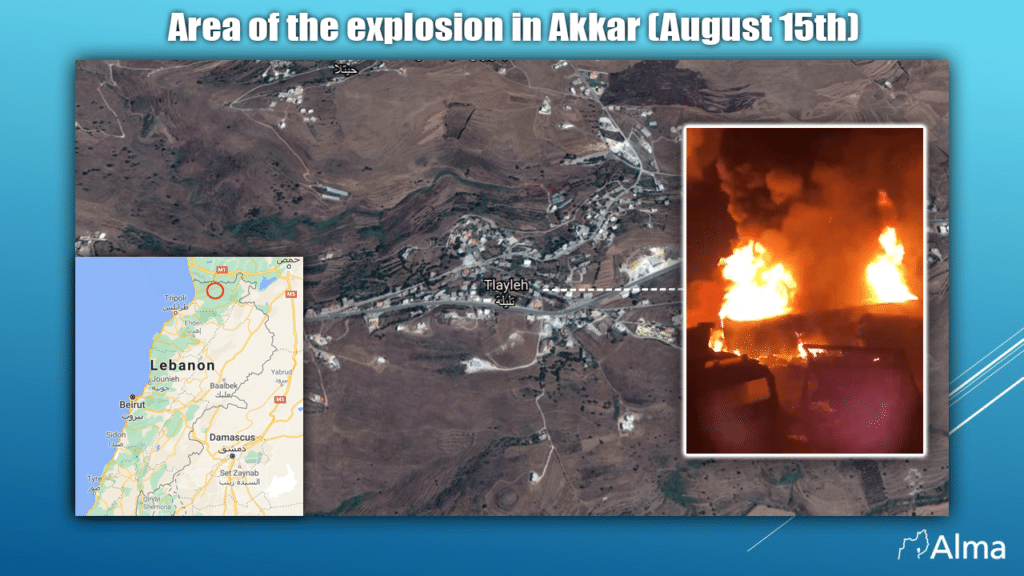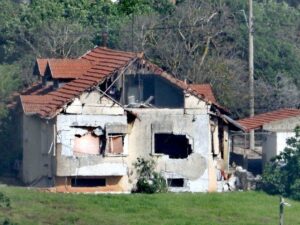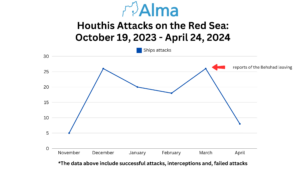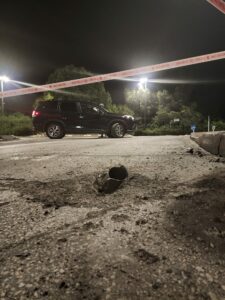The explosion in Akkar: a trigger for Hezbollah to cynically reinforce the narrative of not only being Lebanon’s “military defender”, but also its “economic defender”
Currently, Hezbollah is not linked to the fuel depot explosion in Akkar and, therefore, cannot be directly implicated in the blast. However, Hezbollah is the main factor indirectly to blame for the circumstances that ultimately led to the explosion in Akkar. On the one hand, Hezbollah indirectly caused the explosion. On the other hand, Hezbollah will benefit significantly from it, using the occurrence to achieve its goals. If Iranian fuel reaches Lebanon, Hezbollah will take complete control of the Lebanese fuel market. Regardless of the arrival of Iranian fuel or its non-arrival, Hezbollah is already creating the new narrative: Hezbollah is not only Lebanon’s “military defender” but also Lebanon’s “economic defender.”
Over the past year, there have been three explosions in Lebanon that have made headlines: The explosion in the port of Beirut in August 2020, the explosion in the village of Ain Qana in September 2020, and the last of the three, the explosion in the Akkar district in the town of al-Talil on August 15, 2021. The first two explosions, in the port of Beirut and in Ain Qana, are directly linked to Hezbollah. They took place at sites and buildings belonging to Hezbollah and were caused by Hezbollah activity related to the storage of weapons and materials associated with the manufacture of weapons. In the town of al-Talil, the explosion was caused by the unlawful storage of illegal fuel traded and smuggled as part of the booming black-market fuel industry in Lebanon.
We currently have no indications linking Hezbollah to the latest blast on August 15, leaving 31 dead and about 80 wounded, followed by a declaration of a national day of mourning (August 17). However, it is indisputable that Hezbollah is the leading player in Lebanon’s fuel smuggling and black-market fuel industry to Syria, increasing its economic revenues. The black-market fuel industry allows Hezbollah first and foremost to maintain its operational capabilities by controlling “private fuel depots” through Hezbollah’s network of gas stations – “Al-Mana.” the above allows Hezbollah operational redundancy. Hezbollah also maintains its ability to provide fuel to its supporters within the Shiite population. As noted, it is not possible, at this time, to link Hezbollah to the explosion in Akkar. However, it will be difficult to counter the claim that these three explosions were caused by a lack of governance by the Lebanese state.
The economic crisis in Lebanon, combined with Hezbollah’s black-market fuel activity, led to the collapse of the energy economy in Lebanon. In Lebanon, there is a severe shortage of fuel and diesel in the free civilian market. This shortage causes severe damage to government institution activities (power plants, water pumping stations, hospitals, etc.), damage to the private sector (bakeries, restaurants), and impairment to the daily lives of Lebanese citizens (electricity in homes, fuel for cars).
Ironically, after the explosion and after understanding the extent of the damage and casualties, voices began to call out for the evacuation of the wounded to countries outside Lebanon in light of the Lebanese hospitals’ inability to treat the injured due to lack of electricity deriving from the fuel shortages. A Turkish plane landed in Beirut to evacuate the wounded to Turkey. Egypt had also offered medical assistance.
The announcement by the Governor of the Central Bank of Lebanon, Riyad Salameh, proclaiming that the subsidy on fuel and diesel will be abolished and that he will not be able to thaw foreign currency reserves in favor of purchasing and importing fuels, has caused fuel and diesel prices to rise fivefold. This announcement stemmed from the Governor’s desire to protect Lebanon’s depleted foreign exchange reserves. In practice, however, the declaration intensified the chaos in the Lebanese energy market, playing into Hezbollah’s hands. Hezbollah created the problem and the chaos, and now it’s benefiting from the situation it created. In his August 15 speech, Nasrallah did not miss the opportunity to “make the most of it”…
In his speech on the occasion of the seventh night of the month of Muharram, Nasrallah cynically took advantage of the blast in Akkar, which took place several hours earlier, to convey his messages to advance Hezbollah’s interests at the expense of the Lebanese state:
Nasrallah expressed support for the residents of Akkar, noting that all of Hezbollah’s institutions were at their disposal. He added that Lebanon is a strange country, as any such event is used to make political capital and square accounts rather than put aside differences. The explosion, Nasrallah said, should be a stimulus for forming a government quickly while each side needs to make the necessary concessions.
During the speech, Nasrallah reached his peak (as only he knows how to do) in terms of cynicism and hypocrisy: “Whoever hides fuel from the state is greedy, a criminal and a traitor no matter what ethnic group he belongs to…” He only forgot to mention that Hezbollah is the leading party in Lebanon, which manages an independent black-market fuel industry parallel to the Lebanese state legal fuel market.
Nasrallah continued to intensify the influential narrative of “foreign intervention in Lebanon” and blamed the US for the chaos in the country. Here, too, he forgot to mention that Iran is one of the major countries interfering in Lebanon’s internal affairs. Next, Nasrallah continued to attune Lebanese domestic public opinion by announcing that Hezbollah would make sure to bring fuel and diesel from Iran and, within a few days, would notify when it would do so. According to Nasrallah, Israel is in a state of panic since bringing fuel from Iran strengthens Iranian influence in Lebanon and is a blow to Israeli policy.
Currently, Hezbollah is not linked to the fuel depot explosion in Akkar and, therefore, cannot be directly implicated in the blast in Akkar. However, Hezbollah is the main factor indirectly to blame for the circumstances that ultimately led to the explosion in Akkar. On the one hand, Hezbollah indirectly caused the explosion. On the other hand, Hezbollah will benefit significantly from it, using the occurrence to achieve its goals. If Iranian fuel reaches Lebanon, Hezbollah will take complete control of the Lebanese fuel market. Regardless of the arrival of Iranian fuel or its non-arrival, Hezbollah is already creating the new narrative: Hezbollah is not only Lebanon’s “military defender” but also Lebanon’s “economic defender.”
Appendix – What are the details we know about the site of the explosion, its causes, and those involved?
The Governor’s decision to abolish fuel and diesel subsidies created a great deal of public outrage, prompting citizens to try to ” take control” of gas stations and fuel depots only to have security forces stop them. The Lebanese army and internal security forces announced that they would not sit idly by in the face of the suffering of the Lebanese people challenged by the fuel crisis. Therefore, they would patrol the stations and fuel depots to check the amount of fuel available and ensure there was no hidden fuel. All this to combat the black market created by the crisis in the fuel market.
On the night between August 14 and August 15, 2021, as part of the security forces’ activity intended to expose illegal fuel depots, an explosion occurred at a fuel depot in the area of Akkar near the town of al-Talil. The explosion killed 31 people and wounded about 80. Among the casualties were two dead and 18 wounded soldiers belonging to the Lebanese army. The blast occurred while civilians were gathering around after the Lebanese army raided the depot.
Akkar – The northeastern province of Lebanon is located in the northeast of Lebanon, bordering with Syria in its eastern and northern parts. The Akkar area is predominantly rural, populated by a distinct Sunni majority. Akkar is also inhabited by Christian, Alawite, and Shiite minorities. During Syria’s civil war, hundreds of thousands of Syrian refugees arrived in Akkar. The Akkar area is known to us as an area where there are many fuel and drug smuggling routes from Lebanon to Syria.
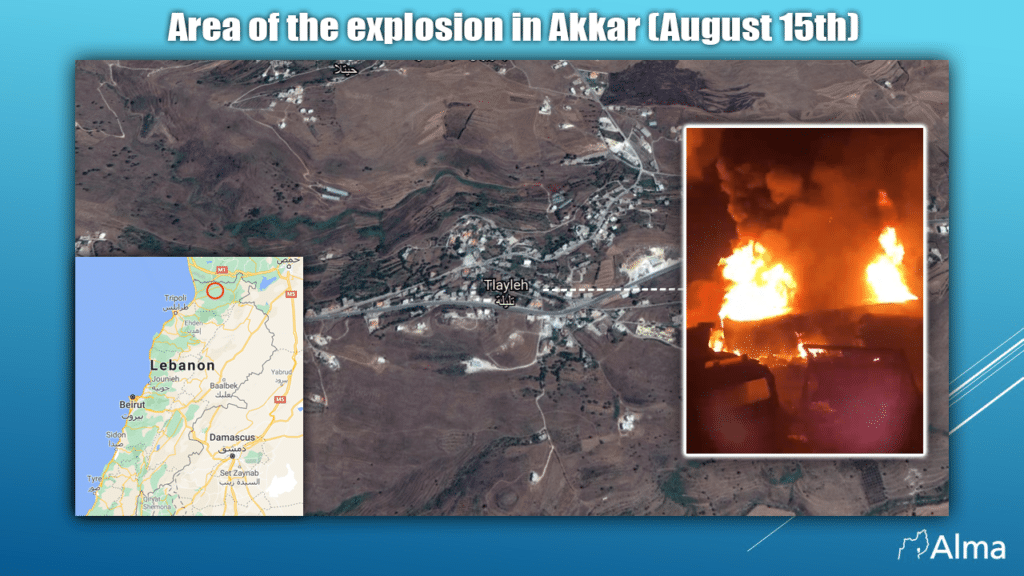
Three main versions to the cause of the explosion: The owner’s son was shooting at Lebanese military personnel, an exchange of fire between the civilians on site, or the igniting of a cigarette lighter by one of the civilians.
The area in a-Talil, where the fuel depot exploded, belongs to George Rashid (who does not currently live in the town). Rashid is known as a fuel smuggler, and he is a supporter of the “Free Patriotic Movement” led by GebranBasil (and President Aoun). The depot belongs to Ali al- Faraj, who also deals in fuel smuggling with his father, Sabhi al- Faraj, who has been in prison for several months.
We know that George Rashid and Ali, and Sabi al-Faraj are partners in the fuel smuggling business together with MP Walid Al-Ba’arini (from Saad Hariri’s al-Mustaqbal party).

After the explosion, George Rashid posted a six-minute YouTube video claiming he had nothing to do with the incident. Rashid blames Ali al- Faraj, stating that he did not know that there was fuel on his land and that he is not involved in the fuel (smuggling) business. His son did not fire a weapon near the fuel depot, and the explosion was caused by someone smoking a cigarette near the fuel depot.

